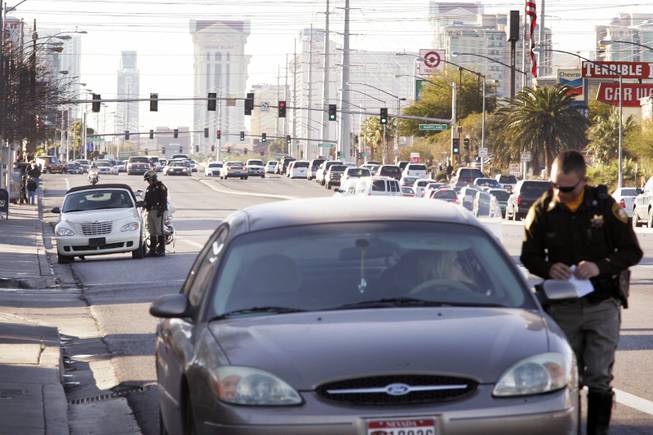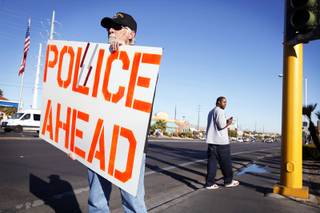
Metro Police’s Traffic Bureau patrols for motorists using cellphones near Flamingo Road and Maryland Parkway on Jan. 6, 2012.
Thursday, April 5, 2012 | 2 a.m.
Metro Police target distracted drivers
KSNV coverage of Metro Police spreading awareness about the law that prohibits drivers from using their cellphone, April 5, 2012.
Watch KSNV reporter Marie Mortera’s story about Nevada drivers still using cell phones at 4 p.m. and 6 p.m. on Channel 3.
Related Content
The days of ordering a pizza on the way home from work or making that last-minute call to make plans ended in January. Forgot to call mom? It will have to wait.
The Nevada Legislature last year said no more — no more talking, texting or surfing the Web on hand-held phones while driving — and joined a handful of other states making it illegal to do so. It was a resounding message to Nevada drivers: Start paying attention to the road or you’ll pay the price.
After a grace period of warnings in the fall, the primary law went into effect Jan. 1, meaning officers could stop and ticket motorists for using their cellphones without other violations taking place. Three months later, authorities said some Southern Nevada drivers have not gotten the hint.
Case in point: A driver recently ran a red light in Las Vegas, causing a collision that killed him. The one unscathed item? A cellphone was in the victim’s hand.
“Clearly, it’s an indicator that people still haven’t gotten the message,” said Sgt. Todd Raybuck of Metro Police’s traffic bureau. “Distracted driving for any reason is dangerous.”
Metro’s traffic officers have ticketed about 2,300 people for using cellphones in the three months since the law went into effect, Raybuck said.
In Henderson, police issued 799 traffic citations to drivers using cellphones through March, with the number decreasing each month so far, according to data provided by the department. Officials with North Las Vegas Police and the Nevada Highway Patrol said they could not easily provide data.
“Nobody’s really surprised about getting the tickets anymore,” Raybuck said. “Unfortunately, some people think that it’s a risk worth taking, and that risk leads to other problems.”
SB 140 (Cell Phones and Driving)
One concern troubling officers in the wake of the new law is more motorists trying to discreetly use cellphones — for instance, holding phones below the dashboard and dialing while looking down, said Raybuck, who called the practice “extremely dangerous.”
Erin Breen, director of UNLV’s Safe Community Partnership, said widespread adherence to the law would be difficult to achieve, given many motorists’ perceived sense of being untouchable.
“People really have this attitude of, ‘I can do whatever I want because I’m not going to get caught,’” she said. “I don’t think that’s law enforcement’s fault.”
That’s where the graduated fine system can help, authorities said. First-time offenders are subject to $50 fines, according to the Nevada Revised Statute. Fines double to $100 for the second offense within seven years and go to $250 for subsequent offenses.
All money from fines goes back to the courts and jurisdictions where the tickets were issued. The money lands in a general fund for the city or county to disperse, police said.
“I’ve always thought a citation is the very best education you can get,” Breen said.
The ban on hand-held cellphone use while driving, however, is a relatively new concept. Nevada is one of nine states in addition to the District of Columbia and U.S. Virgin Islands to legislate the ban, according to the U.S. Department of Transportation.
Metro enforces cellphone ban
KSNV coverage of Metro Police adding patrol to intersections in town to crack down on drivers breaking cellphone use law, Jan. 4, 2012.
On a federal website promoting safe driving, Transportation Secretary Ray LaHood called distracted driving “an epidemic on America’s roadways” that killed nearly 5,500 people in 2009.
Nevada’s law still permits drivers to use hands-free communication technology, such as Bluetooth, but police caution against that, as well.
“If you can avoid using your cellphone for any reason, whether it’s Bluetooth and certainly in your hand, we’d ask that you wait until you get to your destination,” Raybuck said.
Breen said the conversation should start at home with families: Establish guidelines for teen drivers and communicate consequences for using cellphones, with parents setting the example of distraction-free driving.
“It’s going to take everyone being reminded constantly,” she said.
Billboards reminding drivers of the law dot the state’s highways, and Clark County Sheriff Doug Gillespie even recently appeared in a public-safety message to drive home the message.
But police acknowledged traffic citations aren’t the solution. Raybuck said Metro officers issued more than 200,000 traffic citations last year, which he pointed out haven’t eliminated speeding or reckless driving.
“We’re not going to write enough tickets to solve this problem,” he said. “It has to be a change in our community’s culture — the way we view car accidents, the way we view safe driving.”
And for those drivers too tempted by the allure of a phone call or the beep of a text message, authorities offered this suggestion: Make a conscious decision to put your cellphone in a back seat or trunk where it’s out of reach before driving.
“Your most important part of the day should be getting from destination A to B safely,” Raybuck said. “And you can’t do that being distracted.”


Join the Discussion:
Check this out for a full explanation of our conversion to the LiveFyre commenting system and instructions on how to sign up for an account.
Full comments policy